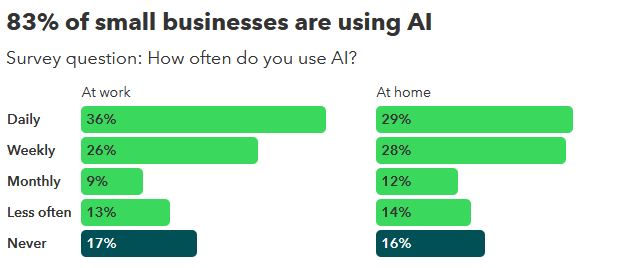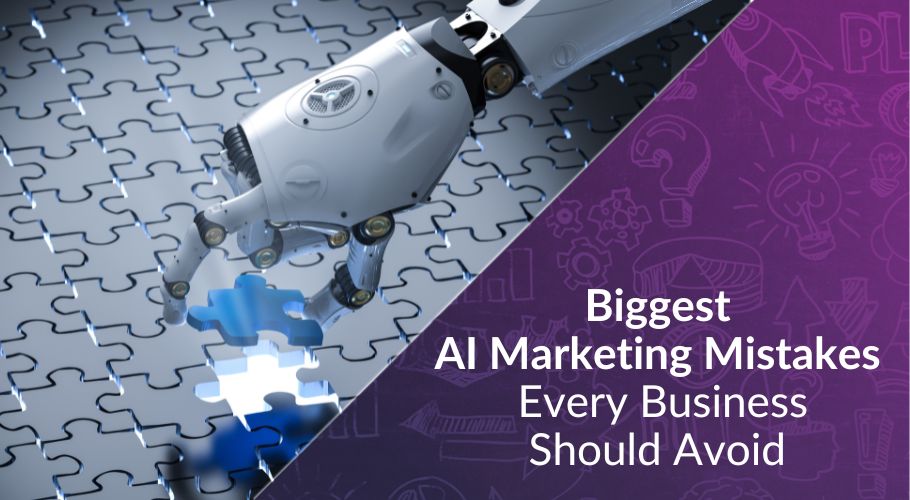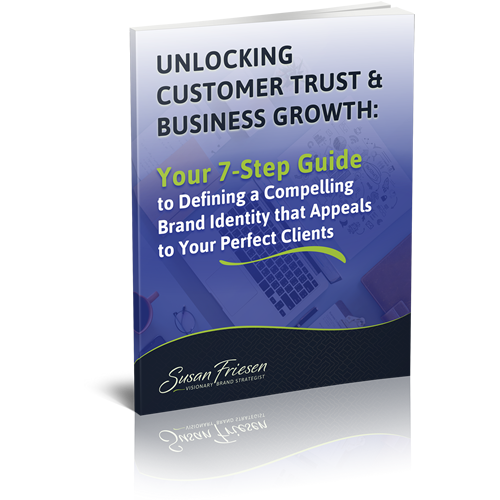With all the nonsense we’ve been fed about artificial intelligence, it’s no wonder that businesses continue to make the same AI marketing mistakes.
Unfortunately, many business owners have the wrong idea about AI, and typically, this is through no fault of their own.
Since its inception, we’ve been hearing about how amazing generative AI is, and how it’s going to allow you to fire your entire marketing team and write an award-winning novel with just a single prompt, along with about a million other claims, most of which have not come to fruition.
To be fair, artificial intelligence platforms like ChatGPT are incredible tools, and in the marketing industry, we use them every day.
They’ve been so disruptive, in fact, that they’ve basically reshaped the world of marketing in a matter of months.
As I pointed out in my article on How Your Small Business Can Easily Leverage AI, a survey from Intuit QuickBooks, which targeted small businesses, found that more than 80% of respondents are already using AI, over a third of them use it daily, and 65% of them said they want to use it more than they already are.

But despite how great tools like ChatGPT are, and how widespread their use is, their value has been completely overblown, and they’ve been made out to be something they’re not.
That being said, if you don’t understand what not to do with AI in marketing, then you’re going to be much more susceptible to being bamboozled by all the hype and making the same AI marketing mistakes that companies keep repeating.
So, if you’re looking to learn about using AI for marketing, but you want to make sure you’re aware of all the AI marketing errors to avoid, then I hope you take the time to keep reading.
Avoid These AI Marketing Mistakes at All Costs
It was inevitable that AI would become a transformative force in marketing, as it enables businesses to streamline operations, analyze vast quantities of data, and improve overall productivity, among many other things.
But despite its massive potential, it is not without its challenges, and businesses can end up making many AI marketing mistakes when implementing this technology.
With that in mind, below you’ll find a list of some of the most common AI marketing errors, complete with actionable advice on how to avoid making them yourself.
1) Failing to Define Clear Goals
When it comes to AI, one of the biggest mistakes businesses make is diving into this technology without a clear understanding of what they hope to achieve.
AI tools are often adopted because they seem cutting-edge or because competitors are using them, but without clear objectives, these tools can fail to deliver any meaningful results.
When AI is deployed without specific goals, you can’t measure its success or determine whether it’s worth the investment, and this lack of direction often leads to underwhelming outcomes, frustration, and the perception that AI does not work.
If you want to avoid this, before implementing any AI technology, first you have to define what you hope to achieve.
Moreover, it’s important to ensure that these goals align with your broader marketing strategy and brand positioning, as AI should enhance and complement your existing efforts.
2) Overdependence on Automation
Automation is one of the most attractive features of AI, as it can handle repetitive tasks, analyze data at lightning speed, and even interact with your customers through the use of chatbots.
But if you rely too heavily on automation, then you could be overlooking the human element that makes marketing more relatable and effective.
When automation dominates your marketing efforts, campaigns can become impersonal.
For example, AI-driven email campaigns may send irrelevant messages if customer preferences aren’t updated, and chatbots can frustrate customers if they provide canned responses that fail to address specific queries.
So, if you want to avoid being too dependent on automation, you should use AI as a way to enhance human efforts, not replace them.
For instance, while AI can draft email campaigns, your marketing team should review and personalize them to ensure they make sense and are aligned with the rest of your branding.
Similarly, chatbots should be programmed to escalate complex issues to a human representative when necessary.
3) Ignoring Data Quality
AI systems thrive on data, but their performance depends entirely on the quality of the data they receive.
That being said, you may underestimate how important clean, accurate, and relevant data is to the success of your AI initiatives.
Because when poor-quality data is fed into AI systems, it leads to inaccurate insights, flawed personalization, and misguided decision-making, and these mistakes not only waste resources but can also alienate customers.
For example, outdated customer information can result in irrelevant product recommendations, while incomplete data can skew analytics and lead to incorrect conclusions.
In order to address these issues, you’ve got to prioritize the quality of whatever data you’re using, which involves conducting regular audits to identify and correct inaccuracies and remove duplicate or irrelevant data.
And if need be, before you even get started, you should also ensure that the AI tools you plan on using can handle large and complex datasets.
4) Lack of Understanding
One of the most common AI marketing mistakes for businesses is implementing AI tools without fully understanding how they work.
This lack of understanding can create several problems, including difficulty in optimizing AI tools, issues related to troubleshooting, and marketing campaigns that produce lacklustre results.
Depending on the circumstances, you can even use AI in ways that inadvertently harm you and your business’ reputation.
In any case, having a solid understanding of the AI tools you’re using is critical, both internally and externally.
Internally, you need to make sure your marketing team understands the AI tools you’re using, even if you’re the only one on that team.
This doesn’t mean you need to become a data scientist, but at the very least, you should have a working knowledge of how these tools generate insights and make decisions.
Externally, you should communicate openly and transparently with customers about how AI is being used, especially when it involves data collection or personalization.
For example, if you’re using AI to recommend products to your customers based on their browsing history, you should let them know.
Read: Why Is Everyone so Afraid of ChatGPT?

If you’re a fan of using generative AI for your business, you may not be aware of the problems people have with this technology. But the truth is people do have legitimate concerns about AI.
However, many of these worries are based on erroneous information, like the idea that AI will make marketers obsolete, which is obvious nonsense.
With that in mind, this article explores the recent history of AI apprehension, debunks the myth that it’ll replace your marketing team, and explains what we and our clients love about this technology.
5) Misinterpreting AI Analytics
AI analytics can provide deep insights into customer behaviour, campaign performance, and market trends.
But if you misinterpret these insights, it’s one of the biggest AI marketing mistakes you can make.
For instance, you may end up coming to incorrect conclusions based on AI-generated data or rely too heavily on correlations that don’t indicate causation.
A common example is assuming that higher engagement on social media will automatically translate to increased sales, in and of itself.
These kinds of assumptions should be avoided at all costs, as they can lead to ineffective marketing strategies and wasted resources.
If you want to avoid this sort of thing, you need to approach your AI analytics with a critical eye, and you and your team should be trained to interpret data correctly and understand its limitations.
It’s also beneficial to cross-reference AI insights with other data sources, like customer feedback or industry benchmarks, to ensure its accuracy.
6) Overlooking Ethical Considerations
Ethics often take a backseat in the rush to implement AI, but neglecting these ethical considerations can lead to significant consequences, including customer backlash, legal issues, and damage to your brand’s reputation.
Common AI marketing mistakes related to ethical considerations include data privacy violations, algorithmic bias, and lack of consent when it comes to data collection.
For example, if your AI system is trained on biased data, it may produce discriminatory advertising or exclude certain groups from marketing campaigns.
Similarly, using customer data without clear consent can violate privacy laws and erode trust.
In order to address these issues, you should prioritize ethical AI practices, like complying with data privacy regulations, auditing algorithms for bias, and being transparent about how you’re collecting and using customer data.
7) Expecting Immediate Results
Artificial intelligence, in all its forms, needs time to learn, adapt, and optimize processes.
However, many business owners tend to expect instant results, and become frustrated when they don’t get them, and this can lead to premature abandonment of AI initiatives.
All things considered, it’s important to view AI as a long-term investment.
Results may take weeks or even months as the AI collects data, identifies patterns, and improves its performance.
In any case, setting realistic timelines and focusing on incremental improvements will help you stay committed and ensure you achieve better outcomes.
8) Not Personalizing Enough
One of AI’s greatest strengths is its ability to personalize your marketing efforts.
But many businesses fail to leverage this potential, instead relying on generic campaigns that often don’t resonate with individual customers, and this lack of personalization can lead to lower engagement and fewer conversions.
At any rate, if you want to maximize AI’s potential, you should use it to analyze customer behaviour, preferences, and past interactions.
This data can then inform highly targeted campaigns, like personalized product recommendations, dynamic website content, and more.
9) Thinking AI Will Replace Your Marketing Team
As much as you may want it to, the reality is AI isn’t going to make your marketing team obsolete.
And even if you’re the only one on that team, ChatGPT isn’t going to be able to do it all for you.
Despite all the claims that have been made about AI, and how amazing a tool it actually is, you can’t just ask AI to write a blog for you, not even bother looking at it, post it on your website, and think it’s going to do anything for your business.
You’re still going to need to know how to train whatever AI you’re using on the specifics of your business and have a good grasp of marketing and branding best practices.
If you don’t have this foundational knowledge, it doesn’t matter what kind of AI you’re using, it’s not going to be of much use.
So, if you do have a marketing team, don’t go firing them tomorrow, and regardless of who’s doing your marketing, you should start brushing up on your AI knowledge right now.
10) Not Editing AI-Generated Text
With so many businesses using AI to generate content, a lot of it is starting to look pretty stale.
Having said that, I think one of the main reasons for this goes back to my previous point, as many businesses think they can just pump out content ad nauseum without even editing it.
But if you’re not editing this kind of content, it’s going to become increasingly obvious to consumers that you’re just pumping out AI-written articles.
You may think that’s okay, but this is never a good look, especially as people are still getting used to the idea of AI-generated content, and many of them can’t stand this kind of content, or even the idea that it was written by AI.
I’m not saying you should hide the fact that you’re using AI for your marketing, but you probably don’t want to be promoting it either.
In any case, you’ve got to edit your content to remove the signs of AI involvement, otherwise, you might as well not even waste your time.
For example, ChatGPT is known for its excessive use of colons and emoticons, especially when it comes to titles, headings, or subject lines, and this is becoming more widely known, as AI’s been around for a while now and people are getting much better at spotting these kinds of things.
So, you should try to avoid using AI-generated content that’s formatted in this way, as it’ll be obvious that it was written by AI.
ChatGPT is also known for its excessive use of certain terms, like the word dynamic, and this can make the content it generates seem unnatural.
But regardless of what kind of content you’re creating with ChatGPT, or any other AI tool, you’ve got to ensure it’s being edited to remove any errors, reflect your brand positioning, and remain consistent with the rest of your marketing.
Nothing should ever be pumped out and then left as is, and careful consideration should always be given to whether or not the content accurately represents your brand.
Overwhelmed by AI and would prefer to leave your marketing to the pros? Why not set up a free 30-minute consultation with me to find out how we can help!
To your business success,
Susan Friesen
P.S. If you liked the article, you might want to subscribe to our newsletter. We publish tons of valuable content to help you learn more about marketing, and subscribing is the best way to ensure you don’t miss out. Additionally, if you’d like to learn more about building a search engine optimized website, click here for our free website guide.







